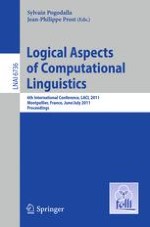2011 | Buch
Logical Aspects of Computational Linguistics
6th International Conference, LACL 2011, Montpellier, France, June 29 – July 1, 2011. Proceedings
herausgegeben von: Sylvain Pogodalla, Jean-Philippe Prost
Verlag: Springer Berlin Heidelberg
Buchreihe : Lecture Notes in Computer Science
